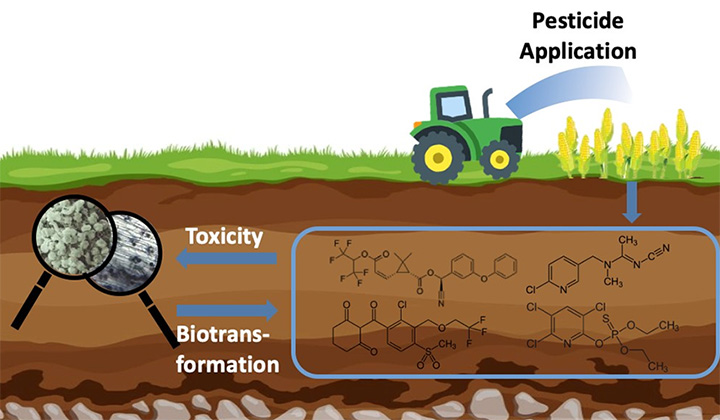Department Environmental Chemistry
ARISTO

ARISTO - Academia Network for Revlsing and Advancing the Assessment of the Soil Microbial Toxicity of Pesticides
Pesticides are major environmental pollutants. For this reason, the European Commission (EC) has imposed a stringent pesticide regulatory scheme for pesticides authorization. The European Food Safety Authority (EFSA) identified soil microorganisms as an attribute to monitor in pesticide environmental risk assessment, and reinforced the need for novel tests to assess pesticide toxicity on soil microorganisms. However, while the risk assessment for aquatic organisms and terrestrial macro-organisms is well defined, the assessment of the toxicity of pesticides on soil microorganisms is still lagging. The ARISTO project aims to fill this scientific and regulatory gap, and to produce the benchmarking knowledge required for the development of advanced tools to evaluate the soil microbial toxicity of pesticides.
In addition to parent compounds, pesticide transformation products (TPs) can also pose environmental risks, since they might exhibit similar or higher toxicity than the parent pesticides if they carry respective toxicophore moieties. Therefore, substantial efforts have been made to enable the in silico prediction of TPs, and a number of highly efficient tools have been developed to predict TPs (i.e., enviPath).
As a subproject of ARISTO, our project will expand the application domain of enviPath to cope with the prediction of TPs for pesticides and to prioritize TPs based on their predicted soil microbial toxicity on key soil functional groups, including ammonia-oxidizing microorganisms (AOM) and arbuscular mycorrhizal fungi (AMF).
The objective of our project can be broken down into three tasks, i.e., (i) upgrading the TP prediction of enviPath by adopting state-of-the-art algorithms and developing tools for automatic transformation rules generation, (ii) building Quantitative Structure-Activity Relationship (QSAR) models to assess the toxicity of pesticides and their TPs, and (iii) improving the data and model accessibility in enviPath.
Our project will meet the emerging demand for estimating the microbial toxicity of TPs while relieving time-consuming and labor intensive TPs characterization. In addition, the algorithms and tools developed in our project are transferrable, meaning that they can be applied and re-trained on different datasets to evaluate the properties of parent compounds and TPs other than microbial toxicity. Overall, our project will provide a pipeline for efficiently predicting soil TPs from parent compounds and evaluate environmental effects of the whole pathway.
